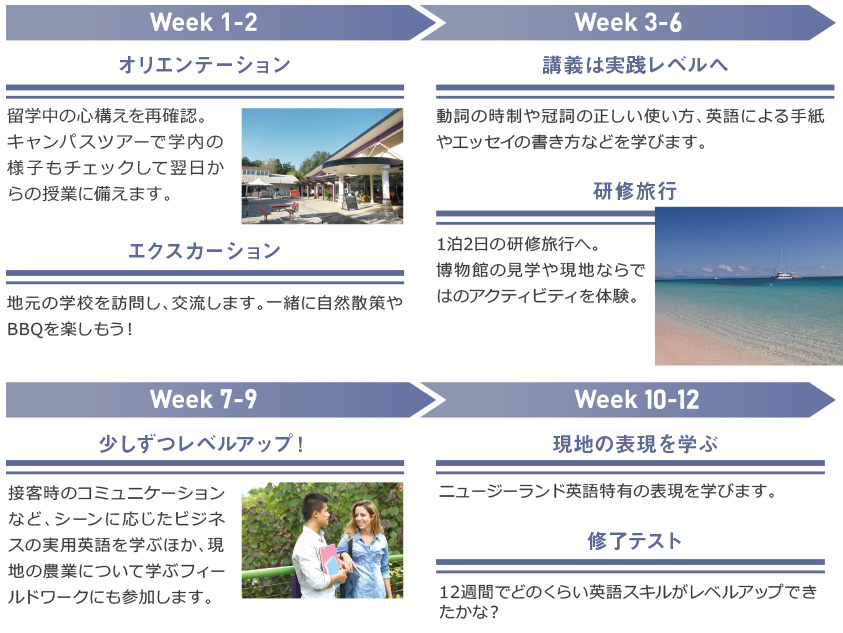During the 12-week study abroad period, you will acquire comprehensive English skills. For those who are not sure what to do at the study abroad destination, we will introduce the schedule from departure to return using New Zealand as an example.
Study Abroad Schedule
※Reference: In the case of mid-term
Timetable (example)
| morning | afternoon | |||
|---|---|---|---|---|
| 1 | 2 | 3 | 4 | |
| MON | Listening Methods | Geography of New Zealand | How to listen to a lecture How to take notes How to ask a question |
Guest lectures |
| TUE | Grammar Review | History of New Zealand | Specialized subjects (e.g. business administration) | |
| WED | Conversation practice | New Zealand Culture | Speaking Practice | Preparation and practice for Japanese culture introduction |
| THU | Introduction to Japanese culture | Elementary school visit Interaction with local students |
Specialized subjects (e.g. media) | |
| FRI | lighting (Write about visiting an elementary school) |
Comparing Japan and New Zealand (education systems) | Towards the exchange meeting Communication Practice |
Interaction with local students |
*This may be subject to change.
Accommodation
At your study abroad destination, you will live in a dormitory or homestay (depending on the country and university) for 12 weeks. Dormitory life where you live with local students and international students from all over the world, and homestay where you become familiar with the unique customs and culture of that country in a local family. It seems like you'd like to experience both.
Dormitory

Living in a dormitory with students of the same age has the great advantage of making local friends. Also, dormitories often house students of various nationalities, so you can communicate with people of nationalities you may not have had the chance to meet. This can greatly broaden your horizons. Many people continue to keep in contact with friends they make in the dormitory even after returning home, so it's a good idea to use it as an opportunity to make valuable friends.
Homestay

In Japan and abroad, the way people ride trains and buses, how they shop, and other lifestyle habits are completely different. In such cases, your host family can be a good role model. Also, by listening to your host family's conversations and joining in their circle, your listening and speaking skills will improve dramatically. By living together, you will have more opportunities to learn living foreign language, such as simple expressions used by native speakers.
Study Abroad Tips

Go find something you're passionate about!
I think the key to studying abroad is to find something that you can devote your energy to. For example, if you like dancing, you can dance with local people and become friends with them. As you eat and talk with them, you will get used to the language and learn a lot about the country. If you can accept different values, your way of thinking about things and your outlook on life will change and your horizons will broaden. That's what happened to me. I encountered rakugo when I studied abroad in Japan and fell in love with it. Rakugo, which I had been just enjoying, turned into a research subject, and now I'm a university professor. I think I was able to have a fulfilling study abroad experience because I was able to devote my energy to rakugo. There are still many things I don't know about overseas. 12 weeks will pass in the blink of an eye, but talk to people, go out, and find something that you can devote your energy to. It will expand your possibilities.
